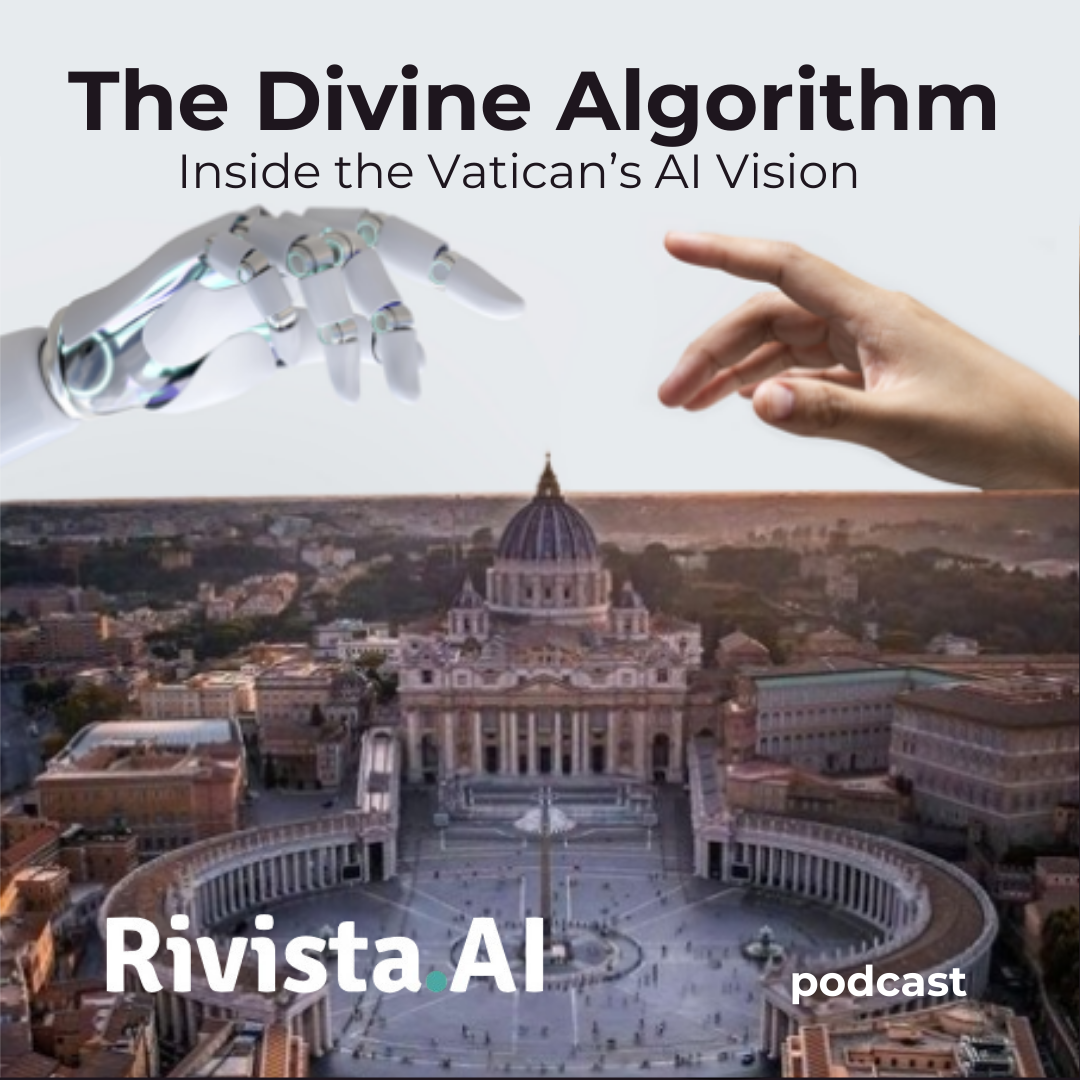Un podcast in inglese su questo tema può contribuire significativamente alla diffusione e all’influenza della visione del Vaticano sull’intelligenza artificiale e le sue implicazioni etiche, favorendo un dialogo ampio e interculturale.
Welcome to “Ethics and Artificial Intelligence,” the podcast where we dive into the intersection of technology and human values. Today, we’ll be discussing a critical topic: the ethical implications of artificial intelligence (AI) and how the Vatican is leading efforts to address these challenges. In a world where AI is rapidly reshaping how we live, work, and interact, it’s more important than ever to ensure that technology uplifts human dignity and fosters peace.
The Need for an Ethical Framework
Host: Artificial intelligence has the potential to revolutionize every aspect of life—healthcare, communication, education, and security. But with these advancements come significant ethical challenges. The Vatican, recognizing the transformative power of AI, has called for a robust ethical framework to guide its development and use.
In 2020, the Vatican introduced the Rome Call for AI Ethics, a foundational document outlining principles for the responsible use of AI. These include:
- Transparency: AI systems must be understandable and accessible.
- Inclusion: AI must not exclude or marginalize individuals or groups.
- Responsibility: Developers and users of AI should be accountable for the consequences of their systems.
- Impartiality: AI must be free from bias and discrimination.
- Reliability: AI technologies need to be safe and trustworthy.
- Privacy: Personal data must be protected at all times.
This framework is designed not just as a theoretical guide, but as a practical foundation to ensure that AI systems are fair, respect human dignity, and promote the common good. It calls for collaboration between tech developers, policymakers, and society to embed these principles into AI from its inception.
The Pope’s Perspective
Pope Francis has been an outspoken advocate for ethical AI. He has repeatedly emphasized that technology must serve humanity, not dominate it. The Pope has cautioned that without proper oversight, AI could deepen social inequalities and create new forms of exclusion.
“Every technological advancement must be evaluated based on its ability to improve the quality of life and promote peace.”
These words resonate as the world grapples with crises such as the COVID-19 pandemic and climate change. The Vatican believes that AI should be leveraged to tackle these global challenges rather than contribute to them. Pope Francis advocates for the development of AI that prioritizes human rights, protects vulnerable populations, and enhances the collective well-being.
Additionally, the Pope has urged vigilance, stressing that AI should never replace human relationships or diminish the essence of our humanity. Instead, it should help us connect, understand, and empathize with one another.
Interreligious Dialogue and Collaboration
The Vatican has not approached this task alone. It has initiated dialogues with faith leaders across the globe—representatives from Abrahamic and Eastern religions—to address the ethical challenges of AI. These interfaith discussions seek to ensure that spiritual and moral values shape AI development.
This collaborative effort has underscored the need for a global, united response. Ethical issues related to AI transcend borders and beliefs, requiring diverse cultural and religious perspectives to shape a holistic vision. By engaging in this cross-cultural dialogue, the Vatican promotes a vision of AI that respects human dignity and justice, regardless of faith or nationality.
For instance, recent interfaith conferences have explored how principles like justice, compassion, and stewardship—common to many religious traditions—can inform global AI policies. Faith leaders have also discussed AI’s dual potential to either widen societal gaps or become a tool for human flourishing. The Vatican has emphasized that these ethical considerations must be a priority in AI’s development, ensuring that no single religious or secular viewpoint dominates the conversation.
Practical Initiatives and Global Collaboration
Beyond advocacy, the Vatican has launched tangible initiatives to promote ethical AI. It has partnered with universities and research centers to develop educational programs on AI ethics. These initiatives aim to train future generations of developers and tech leaders to navigate the complexities of AI with a strong ethical foundation.
One such collaboration is with leading tech institutions to integrate AI ethics into academic curricula. This ensures that future AI professionals are not just technically proficient but also mindful of the moral implications of their innovations.
Additionally, the Vatican participates in international conferences, contributing to global discussions on AI’s future. These conferences—attended by tech leaders, policymakers, and ethicists—offer a platform for the Vatican to advocate for AI that prioritizes human rights and the social good.
Key topics in these initiatives include:
- AI for vulnerable populations: How AI can protect refugees, combat poverty, and assist marginalized communities.
- AI for peace: The potential for AI systems to reduce violence and improve international diplomacy.
- AI and climate action: Using AI to monitor and mitigate climate change through advanced data analysis.
Through these actions, the Vatican is ensuring that AI aligns with social justice, environmental stewardship, and the protection of human dignity.
Conclusion
The Vatican is playing a pivotal role in addressing the ethical challenges posed by artificial intelligence. Its vision underscores the importance of using AI responsibly, with a commitment to values like justice, dignity, and peace. As we look ahead to a future shaped by AI, it is critical that we, as global citizens, reflect on how we can contribute to a world where technology enhances our shared humanity.
Thank you for tuning in to this episode of “Ethics and Artificial Intelligence.” As we move forward, let’s remember the importance of thoughtful, ethical innovation. Technology should always serve people—not the other way around. We hope to see you in the next episode. Until then, take care!
